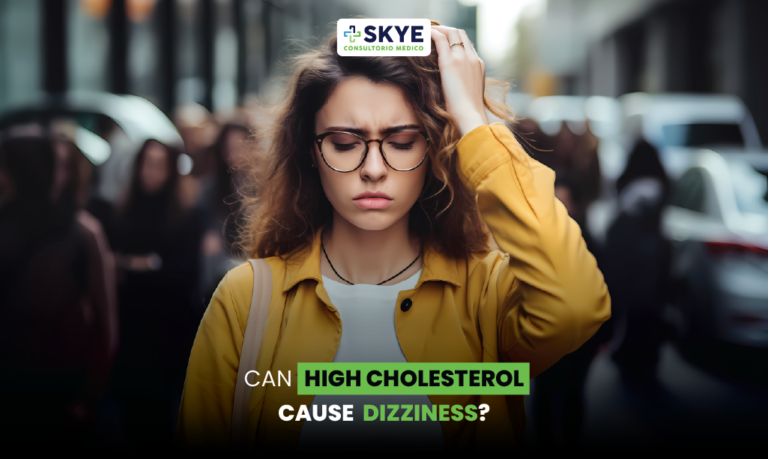There are times when standing up quickly may cause a sensation of the room spinning.
Dizziness can result from many things; one unanticipated reason could be high cholesterol. But can high cholesterol cause dizziness, and if so, how?
Learning about it may help deal with these worrying signs. Let’s understand more about how high cholesterol influences your health.
Cholesterol: What You Need to Know
This waxy substance present in the blood is critical for forming healthy cells.
But excess cholesterol can be harmful. You have two primary kinds:
- LDL (low-density lipoprotein) – also called “bad” cholesterol.
- HDL (high-density lipoprotein) –this is the “good” type.
Balancing these is essential for good health.
The Role of Cholesterol in the Body
Cholesterol is vital. It helps produce hormones, vitamin D, and elements that improve digestion. But, issues arise when levels of LDL cholesterol become too high.
Fatty deposits may form in blood vessels. Blocked blood flow can trigger some health problems, and dizziness is one of them.
Can High Cholesterol Cause Dizziness?
It’s quite common to question whether high cholesterol can cause dizziness. Though high cholesterol doesn’t directly result in dizziness, it can contribute to conditions that do.
Too much cholesterol can block blood vessels, lessening the blood flow to the brain and possibly leading to feeling off-balance.
Can High Cholesterol Cause Headaches and Dizziness?
Commonly, people wonder if increased cholesterol leads to headaches and feeling unsteady. The link primarily lies in reduced blood flow.
When the brain receives less oxygenated blood due to blockages, it could trigger headaches—often called high cholesterol headaches.
Regulating your cholesterol could help reduce these symptoms and improve your overall health.
Cholesterol Hazards and Their Impact on Health
Recognizing cholesterol hazards is vital for preventing major health problems.
High cholesterol is a major risk factor for heart disease, stroke, and other cardiovascular complications.
If it’s not controlled, it can produce serious outcomes, including the previously discussed symptoms.
Regular Check-Ups are Crucial
Regular check-ups with your medical professional can help keep track of your cholesterol levels and spot possible problems early.
Catching and managing issues early can prevent cardiovascular diseases and symptoms like dizziness and headaches.
Lifestyle Changes to Manage High Cholesterol
High cholesterol is often regulated by lifestyle adjustments. Here are some helpful strategies:
-
Diet
Eating lots of fruits, veggies, whole grains, and lean proteins can help manage cholesterol levels. Limiting saturated fats and trans fats can also be beneficial.
-
Exercise
Getting some physical activity regularly can help increase HDL (good cholesterol) and decrease LDL (bad cholesterol).
Try for 150 minutes of moderate aerobic exercise or 75 minutes of vigorous exercise every week.
-
Weight Management
Staying within a healthy weight range can positively impact your cholesterol levels. Even losing a little weight can help lower cholesterol and boost your overall health.
-
Quitting Smoking
Smoking can harm your heart health. If you stop smoking, it can boost your HDL cholesterol level and cut down the likelihood of heart disease.
-
Limiting Alcohol
Drinking in moderation can benefit your heart, but too much can lead to health issues like high cholesterol. Cutting down on alcohol can help manage cholesterol levels.
Medical Interventions
Sometimes, lifestyle adjustments might not be enough to keep cholesterol under control. In such cases, your doctor might recommend medications that lower cholesterol.
The Role of Medication
Medications can effectively reduce high cholesterol and the risk of heart diseases. Follow your doctor’s advice and schedule regular check-ups to adjust the medication as needed.
When to Get A Medical Appointment
If you’re dealing with symptoms like dizziness, headaches, or other high cholesterol-related signs, it’s vital to get in touch with your doctor as soon as possible.
They can assess your cholesterol and heart health.
The Takeaway
Can high cholesterol cause dizziness? While not directly, it can contribute to symptoms affecting your quality of life.
Knowing the link between cholesterol and dizziness can help you make informed decisions about your health.
Managing your cholesterol through lifestyle changes and medication can decrease the risk of dizziness and related symptoms.
And if high cholesterol is a concern for you, remember, it’s never too early to start taking proactive steps.
Next Steps
At Skye Consultorio Medico, we put your health and well-being first. Our team of experts is ready to provide all-encompassing care and advice on managing high cholesterol and related symptoms.
Book a consultation today to assess your cholesterol levels and chat about customized strategies to better your heart health.
A healthier you starts at Skye Consultorio Medico. Reach out to us now.
FAQs
Does high cholesterol make You dizzy?
Yes, but indirectly. Lower blood flow due to blocked arteries could mean less oxygen gets to your brain, which could make you feel dizzy.
If you have these symptoms, seeing a medical professional to assess your cholesterol and heart health is vital.
What are the 5 signs of high cholesterol?
- Chest pain or angina.
- Fatty deposits under the skin known as xanthomas.
- Cold or numb limbs.
- High blood pressure.
- Frequent dizziness or headaches.
How do you feel when your bad cholesterol is high?
You may not notice anything at first. But, as time goes on, you could feel tired, struggle with chest pain, or find it tough to breathe due to blocked arteries.
What are the side effects of very high cholesterol?
It can put you in danger of serious health problems like heart conditions, strokes, and hardening of the arteries. It may also cause symptoms like chest pain, high blood pressure, and a higher chance of heart attacks.
What are the symptoms of bad cholesterol increase?
You might experience frequent headaches, dizziness, chest pain, and cold or numb hands and feet because the blood flow isn’t so good.

